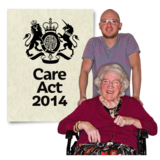Your right to care and support

Your rights to care and support are covered by the Care Act 2014.
The Care Act 2014 is a law about care and support for adults in England.
It says what care and support people should be able to get. It also says what local councils have to do.

If you need some support to live your life, you have a right to a conversation with a social worker.
The social worker must listen to you to understand:
- what is important to you
- what might help you to live your life in the way that you want to.
The Care Act 2014 calls this conversation a needs assessment.

The social worker must consider your wishes and feelings, and the views of other people who are important to you.
People who care about you can help you take part in the conversation if you need some support.

You have a right to an independent advocate if you don’t have anyone else who can help you.
An independent advocate can help you to
- understand information and your rights
- make decisions
- tell other people what you want to happen.

If the social worker thinks you have eligible needs for care and support, you have a right to have these needs met by the council.

You have a right to a care and support plan that reflects your needs and wishes.
You also have a right to a review to check if the plan is working and if anything needs to change.
If you don’t have eligible needs, you still have the right to information, advice and support to help you.

If you have eligible needs, you have the right to a personal budget.
Your personal budget must have enough money in it to pay for the care and support you need.

You have a right to a financial assessment to work out how much you need to pay towards your personal budget, and how much the council will pay.
.png)
You have a right to a direct payment so you can choose how to use your personal budget.
You can also ask the council to arrange care and support for you if you prefer.

You have the right to choose where you’d like to live, and who provides your care and support.

If you think you or someone you know is being abused, or is at risk of abuse or neglect, you have the right to have your concerns taken seriously and responded to appropriately.
Images provided by Photosymbols
